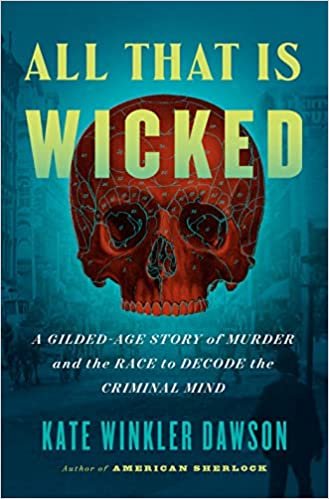
Book Review of All That Is Wicked
A Dive into Darkness: My Thoughts on All That Is Wicked
From the moment I stumbled upon Kate Winkler Dawson’s All That Is Wicked, I felt an undeniable pull. The book promised a dive into the intriguing intersection of crime and societal fascination at the turn of the nineteenth century, and as a true crime enthusiast, I was hooked. Having received an advanced copy from NetGalley and the generous folks at Penguin Group Putnam, I settled in with my cup of tea, ready to uncover the twisted tale of Edward Rulloff.
Dawson invites us into the life of Rulloff—a man whose charm and intellect disguised a deeply sinister nature. It’s compelling how Dawson brings out the idea that some criminals evoke a peculiar sympathy in us, particularly those who blend effortlessly into society. Rulloff, described as good-looking and educated, managed to rise from a troubled past in prison to becoming a schoolteacher and a husband, all the while harboring dark secrets and murderous intentions. I found myself deeply fascinated by his duality: the charismatic man who could so easily hide behind a facade while orchestrating tragedy that would ultimately lead to the deaths of those closest to him.
What struck me most was Dawson’s skillful narrative technique. The story weaves between timelines, revealing Rulloff’s early life, his relationships, and his evolution into a media figure as he stood trial. There was no sense of confusion; instead, the transitions felt organic, guiding me smoothly through the darker turns of his life. Dawson’s writing is not only informative but also imbued with a personal touch that makes each character feel distinctly real. Her ability to create multidimensional characters—including the journalists and early criminologists studying Rulloff—added richness to the narrative and a vivid backdrop to the tale.
One particularly memorable moment was when Dawson describes the media frenzy surrounding Rulloff’s trial. The sensation he stirred produced a cottage industry on its own, echoing our modern-day fascination with true crime. It’s fascinating to think about how society has always had a strange appetite for the sinister, craving to understand what drives an individual to commit such heinous acts. Dawson’s insights into both society’s morbid curiosity and the scientists seeking to decode evil provided an additional layer that resonated deeply with me.
For enthusiasts of true crime, All That Is Wicked is an exquisite exploration not just of Rulloff’s life but of the human psyche and society’s complex relationship with crime. It’s a book that invites readers to ponder the allure of malevolence through an engaging lens, and I suspect it will captivate podcast listeners as well, especially those already leaning into a fascination for this dark genre.
In conclusion, my journey through All That Is Wicked was indeed spellbinding. It’s a treat for anyone interested in early crime stories, psychology, or true crime. Dawson’s ability to navigate the murky waters of morality, ambition, and evil left me with much to ponder long after I turned the last page. If you relish tales woven with a mix of history and intrigue, I wholeheartedly recommend this book as a compelling addition to your reading list.

